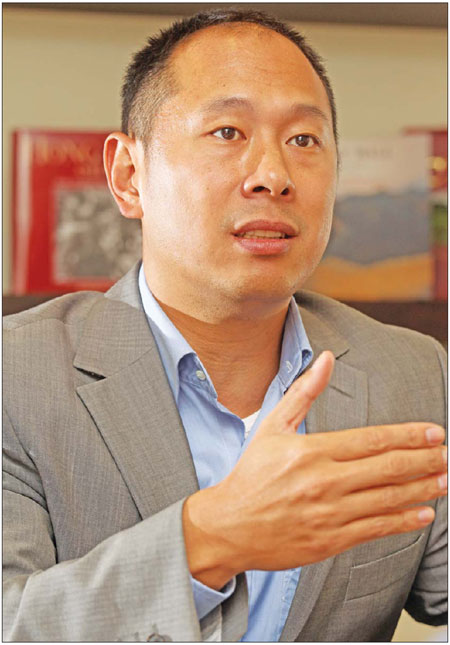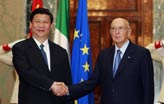In the game
Updated: 2011-06-10 10:25
By Andrew Moody (China Daily European Weekly)
Swiss bank gets access to Shanghai, Shenzhen bourses
|
 Kenneth Ho, head of products, Asia-Pacific for Julius Baer, says China shares are still a major investment opportunity. [Edmond Tang / China Daily]
|
Kenneth Ho is in an expansive mood as he hands out luxury chocolates around the boardroom table. "You can't come to a Swiss bank without having Swiss chocolate. Ours are specifically designed by us,?he says.
The 44-year-old head of products, Asia Pacific for Zurich-based banking group Julius Baer, will soon have more than confectionery to hand out.
The European financial firm has just been handed a $100 million (68 million euros) allocation by the Chinese authorities to invest in the Chinese stock markets.
It is the first private bank in the world to be given direct access to the Shanghai and Shenzhen bourses.
Ho believes being able to offer such an investment opportunity to clients gives the bank an edge over its competitors.
"We think the demand is going to be great. We have got a lot of clients globally who are interested in the whole China story," he says.
Ho is speaking in Julius Baer's office on the 18th floor of the Two Exchange Square building in Hong Kong from where there is a panoramic view of Victoria Harbor.
The bank is one of the most high-profile European financial institutions in the region regularly advertising its services to "high net worth" individuals on television and in other media.
It is targeting people with investable assets - wealth apart from their homes, yachts and cars - of more than $5 million.
"Beyond their toys, it seems everyone and their mother have $5 million in property, although I don't," he says, laughing.
Julius Baer was awarded a qualified foreign institutional investor (QFII) license by the China Banking Regulatory Commission (CSRC) in December, 2010.
It was finally given its actual allocation of $100 million in May this year by the State Administration of Foreign Exchange (SAFE).
After going through the two-stage process, the bank will shortly launch a China fund in which its private clients will be able to invest.
Awarding a private bank like Julius Baer is seen as a strategy change by the CSRC.
So far, most of the QFII allocations have gone to investment banks that have often repackaged slices of them and rented them out to other companies such as hedge funds.
Such short-term operators tend to buy and sell shares on daily basis rather than invest for a longer term which the Julius Baer fund will aim to do.
"The CSRC now wants more actual end-users like us," Ho says.
"It wants people who really buy into a share market and buy into value. Hedge funds are in and out in a day."
The CSRC, in fact, is preventing those in future granted a QFII allocation from renting or leasing out their quota.
"If you look at the people getting approved at the same time as us you have two Taiwanese insurance companies who are long-term holders (of shares) and the Hong Kong Monetary Authority which, of course, is really long term," he says.
Ho, who is known as "Kenny", comes from a Chinese family that emigrated to the United States.
He was educated at James Madison University in Virginia at the University of Chicago Graduate School of Business.
After graduation, he worked for global management consultants McKinsey & Co and then Enron, the US energy and services business well before they became involved in financial scandal.
"I had the pleasure of working in Houston for them. They were just a natural gas pipeline company back then," he says.
E-paper

Harbin-ger of change
Old industrial center looks to innovation to move up the value chain
Preview of the coming issue
Chemical attraction
The reel Mao
Specials

Vice-President visits Italy
The visit is expected to lend new impetus to Sino-Italian relations.

Birthday a new 'starting point'
China's national English language newspaper aims for a top-notch international all-media group.

Sky is the limit
Chinese tycoon conjures up green dreams in Europe with solar panels
